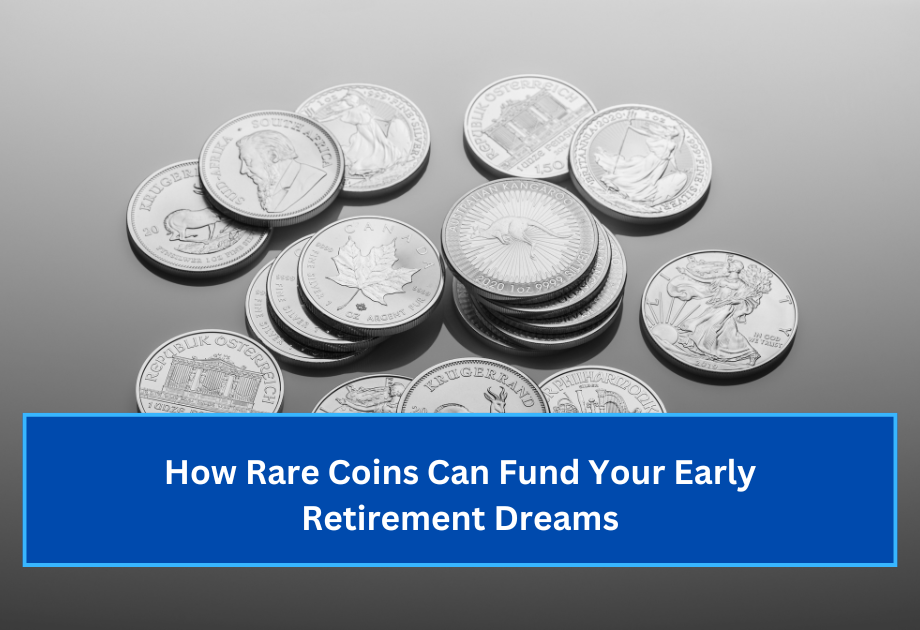Many people dream of retiring early, but few are aware of the incredible opportunities available through unconventional investments. One such opportunity lies in the world of rare coins. Collecting rare coins is more than a hobby—it can be a serious investment strategy for building wealth over time. With proper knowledge, research, and a keen eye for valuable pieces, rare coins can become a source of significant financial return, potentially funding your early retirement dreams. Here’s how rare coins can contribute to your financial future.
1. Understanding the Appeal of Rare Coins
Rare coins, particularly those with historical significance, exceptional rarity, or unique features, have long been a favorite among collectors and investors. Over the years, these coins have shown a tendency to appreciate in value, sometimes at an astounding rate. Coins such as the 1933 Saint-Gaudens Double Eagle or the 1794 Flowing Hair Silver Dollar have sold for millions, making them the stuff of legend among collectors.
2. The Role of Scarcity in Value Growth
The primary factor that drives the value of rare coins is scarcity. Coins that were produced in limited quantities or have unique errors tend to be worth more as time goes on. The more limited the supply, the higher the potential for value appreciation. For example, the 1913 Liberty Head Nickel is one of only five known coins of its kind, which helped it fetch over $4 million at auction in 2018.
3. Long-Term Value Appreciation
Unlike other investments, such as stocks or real estate, rare coins are tangible assets that can appreciate in value without much maintenance. Over the years, the value of certain coins has increased exponentially. For instance, the 2009 U.S. Coin Market Report showed that coin values had grown by an average of 15% annually for the previous decade, far outpacing inflation and many other investment options.
4. Diversifying Your Investment Portfolio
Rare coins are a great way to diversify your investment portfolio. As an asset class, they are not directly correlated with traditional investments like stocks and bonds, which can fluctuate with market conditions. This means that rare coins can act as a hedge against economic downturns.
5. How to Get Started in Coin Collecting
If you’re serious about using rare coins to fund your early retirement, the first step is educating yourself. Learn about the history, types, and grades of coins. Understanding the market and identifying key factors that influence value—such as rarity, condition, and historical significance—is crucial for success.
6. The Potential Risks of Investing in Rare Coins
As with any investment, buying rare coins carries some level of risk. The market for rare coins can be volatile, and there is no guarantee that a specific coin will increase in value. Additionally, buying and selling coins can come with fees, such as auction house commissions and dealer markups.
7. Turning Your Coin Collection into Cash
To realize the value of your rare coin collection, you’ll need to know when and how to sell. While you can hold onto coins for decades, it may be wise to consider liquidating portions of your collection if the market conditions are favorable.
Conclusion
Rare coins offer a unique opportunity to fund your early retirement by building wealth in a non-traditional way. By focusing on scarce, historically significant coins and understanding the market dynamics, you can make informed investments that pay off over time. Whether you’re just starting or looking to expand your collection, investing in rare coins can be a lucrative path to financial freedom.
FAQs
How can rare coins help fund early retirement?
Rare coins, particularly those with historical significance or rarity, can appreciate in value over time.
What factors contribute to the value of rare coins?
The value of rare coins is driven by several factors, including scarcity, historical importance, condition, and demand.
Are there risks involved in investing in rare coins?
Yes, there are risks, such as market volatility, counterfeiting, and the potential for lower-than-expected returns.

